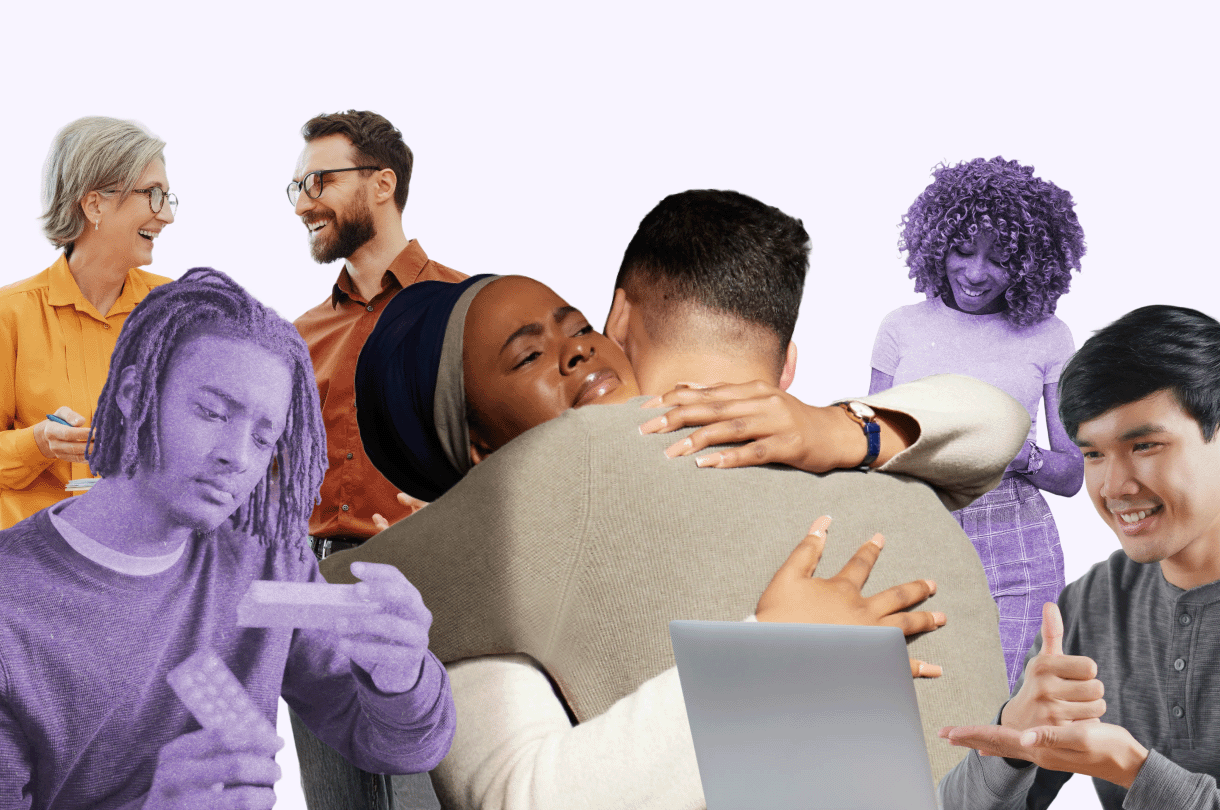One in five adults in America is neurodivergent. Globally, 15-20 percent of the population exhibits some form of neurodivergence.
If you think about it, that means around one out of every five employees in your organization may be neurodivergent. It's easy to understand the imperative need to evolve and adapt—to meet the diverse needs of this growing segment.
In this article, we’ll explore neurodiversity, how to create a neuroinclusive workplace, and why it's essential to prioritize and invest in the success of neurodivergent employees.
Building a neuroinclusive workplace isn’t just the right thing to do—it’s a strategic advantage.
Support neurodivergent employees.
Understanding the dynamics of neurodiversity
Harvard Medical School describes neurodiversity as “the idea that people experience and interact with the world around them in many different ways; there is no one “right” way of thinking, learning, and behaving, and differences are not viewed as deficits.”
Neurodiversity refers to the natural diversity of human brains, recognizing and honoring the neurological differences among individuals.
Here’s a helpful breakdown of the terminology:
- Neurodivergent refers to individuals who think, learn, or process information in ways that differ from what’s considered typical (neurotypical).
- Neurotypical refers to individuals who process information in a way that aligns with what’s considered typical in society."
- Neurodiverse describes a group that includes both neurotypical and neurodivergent individuals.
The link between neurodivergence and mental health
When the term “neurodivergent” is used, many people think only of Autism or ADHD. But it’s far more expansive, including:
- Dyslexia and other learning differences
- Auditory processing differences
- Tourette's Syndrome
- Obsessive Compulsive Disorder (OCD)
- Highly Sensitive Person (HSP)
Neurodivergent people experience the world in ways that differ from what is considered 'typical.' This exists along a continuum that includes diverse ways of thinking, moving, behaving, visualizing, communicating, and processing information.
While it’s not considered a mental health issue, there’s mounting evidence that neurodivergence can increase the risk of mental health issues—often stemming from a lack of support, a lack of knowledge, and the stress of masking or trying to conform to neurotypical expectations.
Psychology Today reports that nearly three in ten children diagnosed with ADHD also have an anxiety disorder. Autistic people have higher rates of anxiety, eating disorders, and OCD, and HSPs have a greater risk of anxiety and depression.
Understanding neurodivergent employees
Navigating a world designed for neurotypical minds can be challenging for neurodivergent people, which contributes to the link between neurodivergence and mental health struggles. This can easily lead to feeling misunderstood and at a disadvantage, burying the unique strengths every person has to bring to the table.
Recognizing the individual strengths of neurodivergent team members and understanding their needs can help reduce barriers and create a more supportive and inclusive work environment.
Here are some of the challenges that many neurodivergent employees face:
- Different approaches to prioritizing and planning
- Literal interpretations
- Direct communication style, sometimes perceived as inflexible
- Variability in reading non-verbal cues
- Heightened sensory sensitivity
- Differences in social interaction styles
- Processing large amounts of information differently
- Emotional exhaustion from masking or navigating neurotypical expectations
The advantage of integrating neurodivergent workers throughout your organization
Neurodivergent employees bring valuable perspectives and a diverse range of hard and soft skills that enhance innovation, problem-solving, and overall workplace performance.
A Deloitte report states, “Research suggests that teams with neurodivergent professionals in some roles can be 30% more productive than those without them.” This may be due to the diverse cognitive strengths that neurodivergent employees bring, enabling innovative problem-solving and different approaches to tasks.
Neurodivergent employees bring diverse strengths and valuable talents to the workplace. Here's a quick look at just a few:
- The ability to hyperfocus on tasks and remember large amounts of detailed information
- Identifying trends, rules, and patterns in data
- Rapidly processing visual information
- Remembering large amounts of detail
- Good problem-solving skills
- Out-of-the-box, big picture, and critical thinking ability
- A high level of empathy and integrity
What every employee needs is different, and it’s always best to ask, never assume. Here are a few things you could offer to get this conversation started:
- Clearly defined routines and expectations
- Structure and consistency
- Flexible environments
- Sound and light adjustments or accommodations
- Task management tools
- Permission for remote employees to turn the camera off during a meeting
A neuro-inclusive workplace delivers meaningful benefits
As the number of neurodivergent individuals in the workforce continues to climb, every organization must ensure its environment is conducive to all employees. Neuro-inclusion isn’t just about inviting neurodivergent individuals into a neurotypical environment—it’s about reshaping workplaces to support and empower all ways of thinking. As awareness of neurodiversity in the workforce grows, organizations must ensure their environments are inclusive and supportive for all employees.
A neuro-inclusive culture and comprehensive support system boosts team morale and a sense of community and belonging—and encourages diversity of thought, creative approaches to work tasks, and innovations.
However, many organizations remain hesitant to embrace neurodivergent talent. A recent article in the Harvard Business Review states, “Many people with neurological conditions, such as autism spectrum disorder and dyslexia, have extraordinary skills, including in pattern recognition, memory, and mathematics. Yet, they often struggle to fit the profiles sought by employers.
Companies that have adapted their hiring and workplace practices to be more inclusive of neurodivergent employees report increased productivity, improved work quality, enhanced innovation, and higher employee engagement.
How HR and people leaders can support neurodivergent employees
Building a truly inclusive workplace means equipping leaders with the tools to understand neurodiversity, foster empathy, and normalize conversations to reduce stigma.
There are several ways to cultivate a neuroinclusive workplace, including these proven strategies:
- Avoid assumptions—instead, take the time to discuss each employee’s individual preferences, needs, and goals
- Communicate and acknowledge expectations regarding work performance and workplace etiquette
- Provide flexible task management tools to support different working styles
- Establish structure and consistency in daily routines, providing advanced notice of changes
- Create flexible workspaces and accommodations for sensory needs, such as managing sound and lighting
- Use inclusive language that promotes understanding and respect
- Above all, prioritize kindness, patience, and empathy in all interactions
Become a neurodivergent ally
We’ve touched on the unique experiences of neurodivergent individuals in the workplace. Therapy and coaching can provide invaluable support by helping neurodivergent employees understand their unique wiring, advocate for their needs, and healthily manage their emotions.
Here are a few more ways you can become an ally for your neurodivergent employees:
- Reflect on your own biases as someone who may be neurotypical or neurodivergent
- Recognize and value individual strengths, skills, and contributions of each employee
- Engage thoughtfully, recognizing and respecting the differences among employees
- Take the initiative to learn more about neurodiversity independently, deepening your understanding and empathy
Every employee deserves to feel valued and supported.
Discover how our new neurodiversity hub can empower your workforce.








.png)





.png)
.png)
.png)
.png)




















